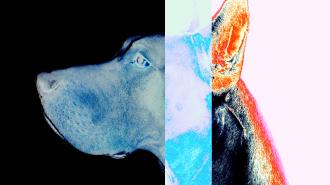The FDA is a major step closer to approving the first anti-aging drug for dogs — and it could lay the groundwork for drugs that extend human lives, too.
The challenge: In nature, larger animal species, like elephants, tend to live significantly longer than tiny ones, like mice, but within a species, the inverse tends to be true: smaller animals tend to live longer.
That’s certainly the case for dogs — the average Chihuahua lives for 13 years, while the average Great Dane has a lifespan of just 9. The large, lovable Bernese mountain dog lives only 8.8 years on average.
While researchers aren’t entirely sure why bigger dogs tend to have shorter lifespans, evidence suggests humans are to blame — centuries of selectively breeding big dogs to create the biggest dogs appears to have left those large breeds with genes that make them more susceptible to cancer and other diseases.
Smaller breeds of dogs, like Chihuahuas, can live years longer than larger ones, like Great Danes.
Canine life extension: Biotech company Loyal is on a mission to extend not just the lifespan of large breed dogs, but their healthspan, meaning the number of healthy years they get to enjoy.
“At Loyal, we see the short lifespan of big dogs not as inevitable, but as a genetically-associated disease caused by historical artificial selection, and therefore amenable to targeting and treatment with a drug,” said Brennen McKenzie, Loyal’s director of veterinary medicine.
The company’s first product, LOY-001, is a medication that reduces levels of IGF-1, a growth-promoting hormone. IGF-1 levels can be up to 28 times higher in large breeds than small ones, and according to Loyal, these elevated levels play a role in the animals’ reduced lifespan.
The medication is designed to be administered as an injection every 3 to 6 months for the duration of a dog’s adult life, and Loyal CEO Celine Halioua told the New York Times that the company expects it to cost “mid-double-digit dollars per month.”
What’s new? Loyal is currently working with the FDA to secure approval for LOY-001, and on November 28, it announced a milestone in that effort: the FDA believes the data Loyal has shared so far is enough to demonstrate a “reasonable expectation of effectiveness.”
That might sound underwhelming, but Loyal is working to get its anti-aging drug for dogs cleared through the FDA’s Expanded Conditional Approval pathway, which is reserved for treatments that target serious conditions, but that are particularly challenging to prove work.
“We’re going to be going for claiming at least one year of healthy life span extension.”
Celine Halioua
A “reasonable expectation of effectiveness” is the minimum requirement for this pathway. The next step for Loyal is to complete the safety and manufacturing sections of its application. Once the FDA approves those, the company will be able to start marketing LOY-001 to pet owners.
Looking ahead: Loyal is hopeful it’ll wrap up the FDA application process and secure conditional approval in 2026. That approval is valid for one year, but Loyal will have the option of renewing it until a total of five years.
During that time, Loyal will need to demonstrate to the FDA that it is working to produce “substantial evidence” that LOY-001 works — if it can’t do that by the time its conditional approval expires, the agency can pull the drug from the market.
“We’re going to be going for claiming at least one year of healthy life span extension,” Halioua told the NYT.
The big picture: While Loyal is currently focused on helping big dogs live longer, healthier lives, it hopes to eventually apply what it learns from its canine studies to people.
“Dogs are considered one of the best models of human aging,” Halioua told Freethink. “We’ve co-evolved with dogs, we’ve shared an environment with them for tens of thousands of years, they develop the same age-late diseases we do at approximately the same time in our lifespan.”
Because dogs live much shorter lives than we do, it’s easier to see whether an anti-aging drug works on them than on people.
That’s not to say lowering humans’ IGF-1 levels is the key to a longer life, even if it does work for dogs. But Loyal has several meds in development that could be the answer, and simply getting the first anti-aging drug for dogs approved by the FDA could lay the regulatory groundwork for human-targeting meds.
“There’s not a direct link between getting something approved for dogs and getting something approved for humans,” said Halioua. “But if we’re successful in getting this first-ever aging approval through the veterinary FDA, we can set a precedent for this at least being, like, somewhat possible, right?”
We’d love to hear from you! If you have a comment about this article or if you have a tip for a future Freethink story, please email us at [email protected].






